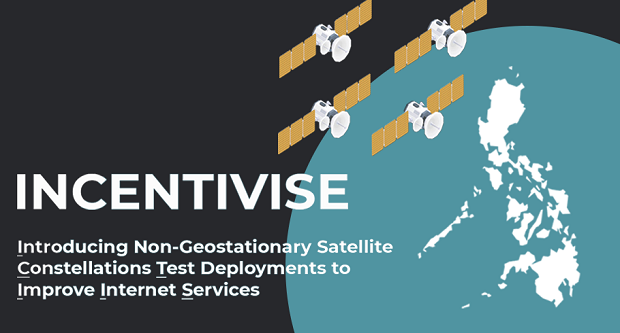The Philippine Space Agency (PhilSA) said on Thursday, Feb. 2, that it has accepted the proposal of United Kingdom-based firm OneWeb to test their satellite Internet services in select remote and rural areas across the country.

Through a project called INCENTIVISE, which stands for “Introducing Non-Geostationary Satellite Constellations Test Deployments to Improve Internet Service,” OneWeb is provided an opportunity to test and demonstrate, on a temporary and non-commercial basis, the high throughput and low latency capability of their satellite broadband constellation.
PhilSA and the satellite Internet company are now “engaged in further detailed discussions on the technical documentary requirements and other logistics of the test deployments, including the timeline and proposed implementation sites,” according to PhilSA director general Joel Joseph Marciano Jr.
The launch and deployment of an additional 36 OneWeb satellites in December 2021 brings the total number of OneWeb Low Earth Orbit (LEO) satellites to 394. According to OneWeb, the constellation is now over 60% complete and will achieve global coverage at the end of 2022.
The PhilSA launched the INCENTIVISE Open Call in October 2021 and invited Non-Geostationary Orbit (NGSO) Satellite Internet Operators (SIOs) to conduct test deployments of their Internet services in the country ahead of possible full commercial service.
PhilSA said the closer proximity of NGSO satellites to the Earth than those in geostationary orbit results in lower latency, thus supporting more delay-sensitive applications such as video conferencing.
Satellite-based Internet may also be relied upon as a robust and rapidly deployable means of communication in times of disasters when terrestrial communications infrastructure is devastated, it added.
INCENTIVISE will also take on a research objective of observing and evaluating actual on-site operational performance and reliability of SIO Internet services, considering local weather conditions.
For this objective, PhilSA is co-implementing the project with the Advanced Science and Technology Institute of the Department of Science and Technology (DOST-ASTI), specifically on deploying weather and performance monitoring systems in the INCENTIVISE test sites.
The partnership also gives PhilSA possible access to the local Internet gateway facilities of DOST-ASTI. With INCENTIVISE, PhilSA said it aims to help address the demand for Internet connectivity in unserved and underserved areas in the Philippines.
According to the PhilSA INCENTIVISE team: “Satellite constellation systems can be used to provide broadband Internet connectivity in rural and hard-to-reach areas where terrestrial networks can be uneconomical and logistically difficult to install and maintain. Telecommunications companies may also take advantage of these satellite technologies to provide backhaul connectivity to their networks and complementary coverage in remote locations.”
Apart from helping to address the digital divide in the country, INCENTIVISE is also envisioned to promote the development of the local space industry. NGSO SIOs can use the successful demonstration in the INCENTIVISE project as a preliminary step towards full operations.
PhilSA is also targeting the entry of new Internet space segment players to accelerate local know-how transfer and retention in space technologies and related ground-based systems, which is seen to open doors to design, manufacturing and supply chain opportunities for local companies and space-adjacent industries in the $400 billion global space economy.




